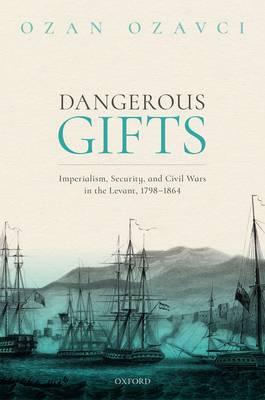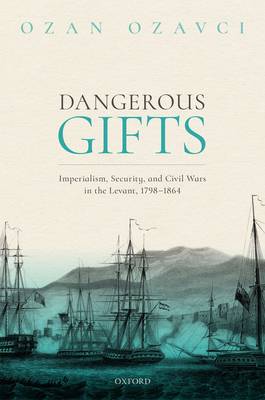
- Afhalen na 1 uur in een winkel met voorraad
- Gratis thuislevering in België vanaf € 30
- Ruim aanbod met 7 miljoen producten
- Afhalen na 1 uur in een winkel met voorraad
- Gratis thuislevering in België vanaf € 30
- Ruim aanbod met 7 miljoen producten
Zoeken
Dangerous Gifts
Imperialism, Security, and Civil Wars in the Levant, 1798-1864
Ozan Ozavci
Hardcover | Engels
€ 225,95
+ 451 punten
Omschrijving
From Napoleon Bonaparte's invasion of Egypt in 1798 to the foreign interventions in the ongoing civil wars in Syria, Yemen, and Libya today, global empires or the so-called Great Powers have long assumed the responsibility to bring security in the Middle East. The past two centuries have witnessed their numerous military occupations to 'liberate', 'secure' and 'educate' local populations. They staged first 'humanitarian' interventions in history and established hitherto unseen international and local security institutions. Consulting fresh primary sources collected from some thirty archives in the Middle East, Russia, the United States, and Western Europe, Dangerous Gifts revisits the late eighteenth and nineteenth century origins of these imperial security practices. It explicates how it all began. Why did Great Power interventions in the Ottoman Levant tend to result in further turmoil and civil wars? Why has the region been embroiled in a paradox-an ever-increasing demand despite the increasing supply of security-ever since? It embeds this highly pertinent genealogical history into an innovative and captivating narrative around the Eastern Question, emancipating the latter from the monopoly of Great Power politics, and foregrounding the experience of the Levantine actors. It explores the gradual yet still forceful opening up of the latter's economies to global free trade, the asymmetrical implementation of international law in their perspective, and the secondary importance attached to their threat perceptions in a world where political and economic decisions were ultimately made through the filter of global imperial interests.
Specificaties
Betrokkenen
- Auteur(s):
- Uitgeverij:
Inhoud
- Aantal bladzijden:
- 418
- Taal:
- Engels
Eigenschappen
- Productcode (EAN):
- 9780198852964
- Verschijningsdatum:
- 15/09/2021
- Uitvoering:
- Hardcover
- Formaat:
- Genaaid
- Afmetingen:
- 163 mm x 244 mm
- Gewicht:
- 793 g

Alleen bij Standaard Boekhandel
+ 451 punten op je klantenkaart van Standaard Boekhandel
Beoordelingen
We publiceren alleen reviews die voldoen aan de voorwaarden voor reviews. Bekijk onze voorwaarden voor reviews.








